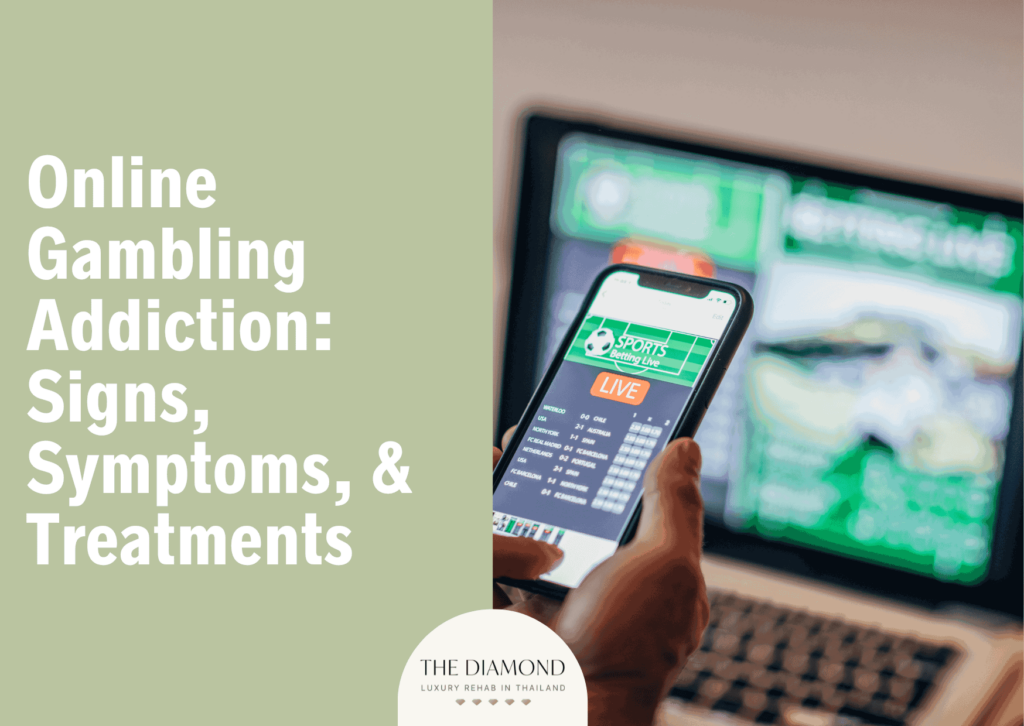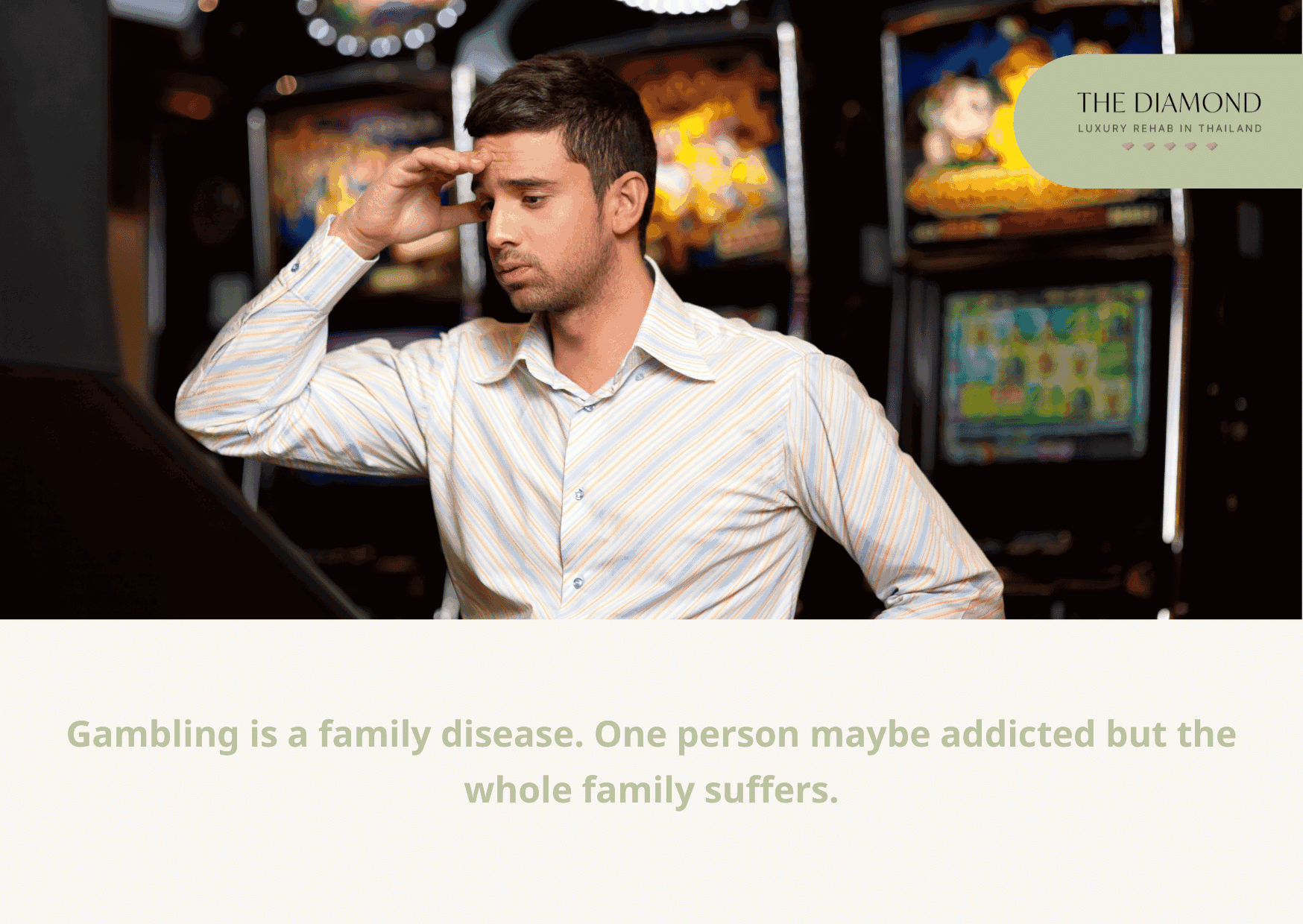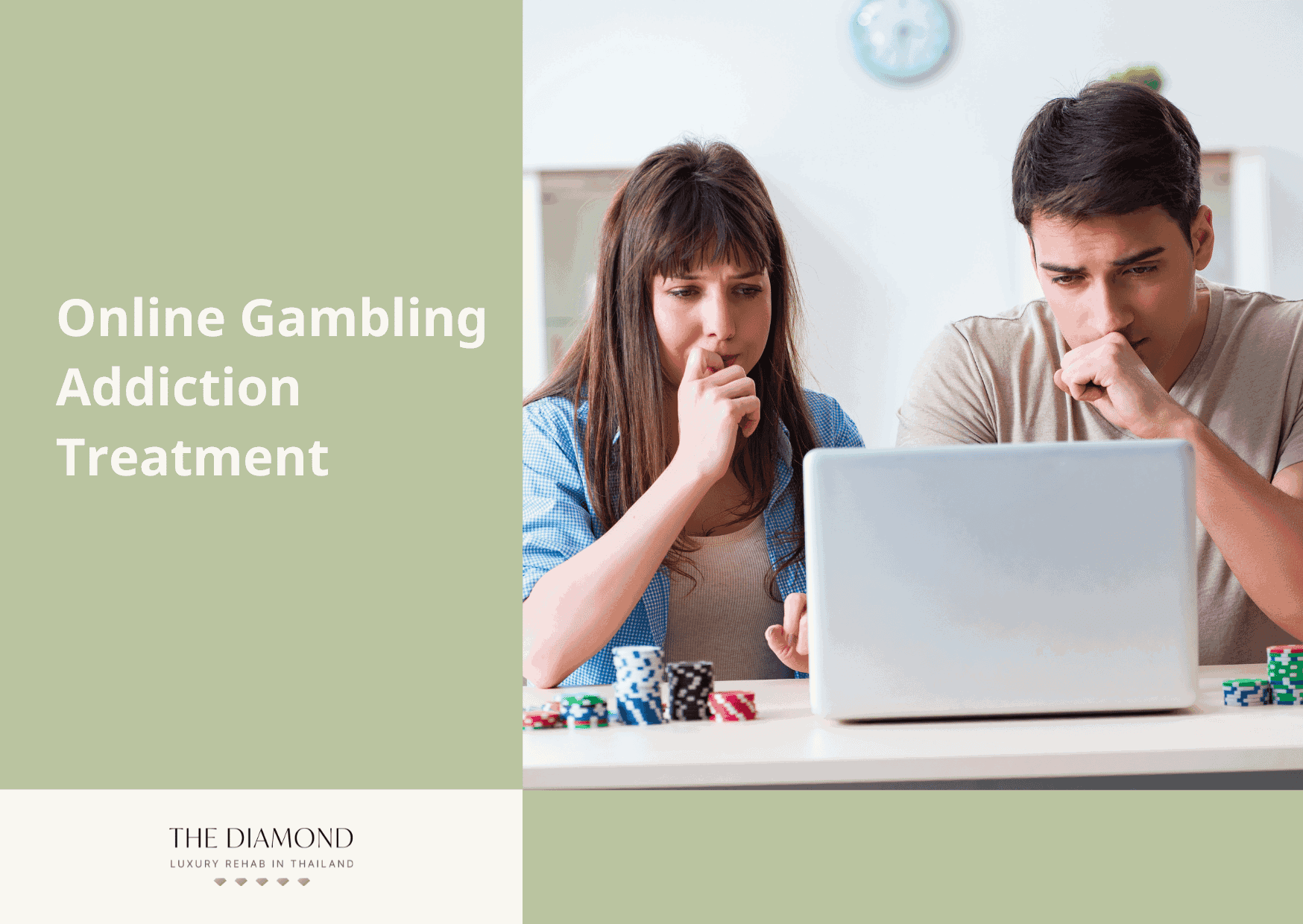Online gambling addiction: signs, symptoms, and treatments
Table of content
- What is online gambling addiction?
- What are the causes of online gambling addiction?
- What are the effects of online gambling addiction?
- What are the signs and symptoms of online gambling addiction?
- How to overcome online gambling addiction?
- What are the risk factors for online gambling addiction?
- How do you treat online gambling addiction?
- Is gambling a mental illness?

Online gambling addiction is a compulsive need to keep gambling online despite the harm it causes.
The main symptoms of online gambling addiction are spending a substantial amount of one’s time on this activity, financial problems, experiencing cravings when unable to gamble online, and willingness to spend large amounts of money.
The causes of online gambling addiction can be biological, social, and psychological. Online gambling addiction is an emotional problem that can exacerbate or trigger mental health disorders such as anxiety, depression, and personality disorders.
The effects of online gambling addiction include financial problems, debts, and even bankruptcy.
Online gambling addiction is treatable, especially with professional help.
What is online gambling addiction?
Online gambling addiction is a progressive addiction classified as an impulse-control disorder. The American Psychiatric Association defines online gambling addiction as a relentless and repeated problematic involvement in gambling activities that can cause significant harm to financial resources, relationships, and physical and psychological well-being.
A person suffering from online gambling addiction continues to engage in gambling activities regardless of the consequences on the different aspects of life. A person is eager to take risks by compromising valued assets such as finances, health, and relationships to win in online casinos, virtual poker, or betting.
What are the causes of online gambling addiction?
The causes of online gambling addiction can be biological, psychological, social, or environmental, all of which are listed below.
- Biological causes: Online gambling triggers the release of dopamine, serotonin, and other feel-good neurotransmitters, according to a paper published in the Journal of Addiction Medicine by Jocelyn L. Topf and colleagues from Yale University School of Medicine. A person wants to experience those pleasant emotions again and continues gambling online. At the same time, receptors of these neurotransmitters weaken, meaning increased exposure is necessary to experience the same effects that may lead to dependence and addiction.
- Psychological causes: Daily life stresses and underlying mental health problems can be a reason a person engages in online gambling. Researcher Sally M. Gainsbury of Southern Cross University in Australia expounds in her paper published in Current Addiction Reports that higher rates of coexisting mental health problems of depression and anxiety are found in online gamblers than in land-based gamblers. This form of gambling becomes a tool to avoid negative emotions and events.
- Social/environmental: Exposure to online gambling increases the risk of developing an addiction. According to a 2022 paper published in Addictive Behaviors by Professor Lia Nower and colleagues from the Center for Gambling Studies of Rutgers University, environmental influences from family and peers contribute to the development of gambling. Early and constant exposure to gambling and familial and peer influences in online gambling may catalyze problematic gambling.
What are the effects of online gambling addiction?
The effects of online gambling addiction are listed below.
- Physical effects: Physical effects of online gambling addiction may manifest as health problems such as lowered immunity and weight gain or loss due to sleep and food deprivation and chronic stress, as Dr. Timothy W. Fong, a clinical professor of Semel Institute for Neuroscience and Human Behavior at UCLA, discussed in a UCLA Health article.
- Psychological effects: Problematic online gambling may also trigger or worsen generalized anxiety, depression, personality disorders, and obsessions.
- Short-term effects: Consistent involvement in gambling activities may result in financial problems, feelings of regret or guilt, increased intake of alcohol or other substances, and less time or money to spend on family and recreation.
- Long-term effects: Prolonged gambling could lead to long-term consequences of serious financial problems, including bankruptcy, relationship problems, poor work performance, job loss, weak overall health, legal issues, suicidal ideations, excessive intake of alcohol and other substances, and the intensified feeling of guilt.
What are the signs and symptoms of online gambling addiction?
The signs and symptoms of online gambling addiction are listed below.
- Obsessing over online gambling
- Experiencing strong cravings when unable to gamble
- Constantly thinking about online gambling, bets, or moves to make
- Gambling online to feel better about life
- Neglecting work or school in favor of online gambling
- Using every opportunity to check gambling platforms or apps
- Spending most of the time gambling online
- Financial difficulties caused by gambling, unpaid bills, and loans
- Taking bigger risks while gambling online
- Feeling guilty, but continuing gambling
- Unsuccessful attempts to stop gambling
- Lying about online gambling
- Social isolation and withdrawal
- Problems with friends, family, and relationships due to online gambling habits
- Being secretive about phone and laptop use
Other possible symptoms of online gambling addiction primarily include:
- Changes in behavior
- Financial difficulties
- Worsened mental health
- Problems with family and friends caused by online gambling
How to overcome online gambling addiction?

Overcoming online gambling addiction involves strong support and well-structured intervention systems. According to a 2021 review published in Current Opinion in Psychiatry by Dr. Davor Bodor and colleagues from different institutions in Croatia, overcoming gambling addiction starts with self-help interventions and mindfulness.
Self-help interventions involve strategies such as limiting access to financial assets and relinquishing credit cards and other means to secure money as an initial measure to overcome gambling. Another step involves deliberately restricting access to online gambling platforms, removing relevant apps, and refraining from visiting gambling websites and apps.
Mindfulness is a form of meditation that involves focusing on the present moment with acceptance. Mindfulness can help overcome problematic gambling by reducing stress, improving awareness, regulating emotions, and managing urges. Focusing on the present and existing emotions enhances understanding of thoughts, cravings, feelings, and sensations and recognizes gambling triggers, patterns, and consequences, thereby encouraging an individual to respond to these triggers and patterns in a healthy manner.
What are the risk factors for online gambling addiction?
The risk factors for online gambling are listed below.
- History of substance use disorders
- Underlying mental health issues (anxiety, depression, or personality disorder)
- Being male
- Younger age
- Family history of gambling problems
- Socializing with people who gamble online
- Certain personality characteristics (competitiveness, being easily bored, impulsive behavior, and being a workaholic)
- Living alone or solitary character and being able to gamble online in private
- Speaking a language other than English
- Self-reporting as a semi-professional/professional gambler
How do you treat online gambling addiction?

Treatment of online gambling addiction involves therapy and support groups. A treatment program helps a person with online gambling addiction develop impulse control to prevent relapse. Individuals with online gambling addiction receive treatment in inpatient or outpatient settings.
An inpatient rehabilitation program is most suitable for patients with moderate to severe addiction, primarily because they need more structure. This is particularly useful for persons who struggle to avoid checking websites, apps, and platforms for gambling. Inpatient programs require patients to spend a set amount of time in a rehab center. The length of the program ranges from 30 days to up to a year.
On the other hand, an outpatient rehabilitation program is commonly applicable for patients with mild addiction. Patients attend classes and counseling sessions in the rehab facility but do not live there. Outpatient rehab is also an option for patients who completed inpatient treatments.
The most significant part of online gambling addiction treatment is psychotherapy, which is performed in individual or group sessions. Therapy is essential for recovery to address deeper emotional and mental health issues that amplified the addiction.
A patient learns to identify and deal with these problems to modify self-destructive behaviors that support the addiction. Counseling is a safe place where patients receive support, encouragement and a safe space to address mental health concerns without judgment and bias.
The most common psychotherapy approach in treating online gambling addiction is cognitive-behavioral therapy (CBT). A 2017 study published in the Annals of General Psychiatry by Dr. Sam-Wook Choi and colleagues from various universities in South Korea reports that CBT is an effective treatment for gambling behavior.
CBT combines various aspects of cognitive and behavioral techniques. Cognitive techniques focus primarily on erroneous beliefs and biased information processing, whereas behavioral approaches revolve around assumptions that addiction is a learned maladaptive behavior. In online gambling disorder, the main targets of CBT are cognitive distortion, decision-making and reward processing, and psychological or physical responses linked to gambling.
CBT involves cognitive correction, social skills training, problem-solving training, and relapse prevention. Cognitive-behavioral therapy is effective in both individual and group sessions in relapse prevention and treating gambling behavior.
Patients of online gambling addiction treatment may also receive other forms of therapy, such as motivational interviewing (MI). This therapy was developed to help patients commit to change and work through ambivalence. The treatment explores the patient’s arguments for change in a supportive and empathic manner. MI has two phases; the first phase revolves around increasing motivation to change, while the second focuses on consolidating commitment.
Support groups are also an essential aspect of online gambling addiction treatment. For example, Gamblers Anonymous and other 12-step programs help patients build a support network where people share their experiences and support one another.
Individuals suffering from online gambling addiction should seek professional help. A well-structured treatment approach and support are vital in overcoming gambling addiction. Treatment of online gambling addiction does not simply involve abstinence from overall internet use, as it has become an integral component of modern life. Through professional help, a person with online gambling addiction learns how to use the internet without yielding to gambling urges and learns how to handle these urges.
Why is online gambling addictive?
Online gambling is addictive because of its accessibility, instant gratification, anonymity, and variable rewards. Easy access and immersive interface often lead to spending more than with physical gambling without realizing the scope of the problem and how constant online gambling affects various aspects of life.
Online gambling is defined as any kind of gambling that takes place on the internet. Online casinos, virtual poker, and sports betting all belong to this category.
People gamble online because of its convenience, comfort, and ease, which are advantages of this kind of gambling. However, the disadvantages outweigh the benefits. The primary disadvantages of online gambling include a higher risk of developing addiction, financial problems, legal and regulatory issues, and an increased risk of exposure to fraud and scams.
With a reliable internet connection and a laptop or smartphone, online casinos and other gambling platforms are readily accessible. The availability of online gambling also contributes to its addictive property, which permits an individual to engage in gambling activities at any time of the day. Moreover, unlike physical gambling, online gambling often goes undetected, making it harder to monitor and regulate.
Frequent casino visits tend to be more noticeable in social circles, allowing friends and family to notice and recognize signs of problematic behaviors. However, it’s difficult to monitor online activities, which allows online gambling to remain unnoticed and increases the risk of addiction.
Online gambling lures individuals with rewards and prizes and effectively induces the desire to win free tokens and other perks. This incentive strategy encourages an individual to play more and spend more, ultimately paving the way for addiction. Another important factor of online gambling is its anonymity feature that gives users and players a false sense of security and freedom to keep gambling.
When is online gambling addiction counseling necessary?
Online gambling addiction counseling is necessary when gambling starts to impact one’s finances, relationships, and overall well-being.
The main problem is that online gambling is hard to detect. An affected person may not realize or acknowledge the problem’s existence because it doesn’t involve actual casinos and betting places.
A person who spends a significant amount time of their time gambling online may consider counseling. Online gambling addiction counseling sessions help identify triggers of compulsive tendencies to engage in online gambling and learn how to cope and resist those triggers. Counseling is also a reasonable and preventive measure for individuals who started gambling online and notice frequent impulse to engage in online gambling habits.
Family and friends may advise counseling to individuals who excessively engage in online gambling, provided that they are aware of this problematic behavior. Individuals may also voluntarily seek counseling help when indicators of addictions, such as financial difficulties, irritability, and social isolation, have affected various aspects of life.
What are the symptoms of online gambling addiction withdrawal?
Symptoms of online gambling addiction withdrawal are grouped into emotional and physical symptoms that a person experiences.
Emotional withdrawal symptoms include intense cravings to gamble online, depression, anxiety, irritability, anger, guilt, and feelings of hopelessness and helplessness.
Physical symptoms of online gambling addiction withdrawal range from insomnia to headaches, sweating, nausea, tremors, racing heart, palpitations, difficulty breathing, tightness in the chest, and muscle tension or soreness. According to a study published in the International Journal of Methods in Psychiatric Research by researcher Renee M Cunningham-Williams and other researchers from Washington University in Missouri, the intensity of gambling withdrawal-like symptoms is associated with the severity of the disorder.
A study published in the Alcoholism, Clinical and Experimental Research by Hermano Tavares and faculty members of the University of São Paulo in Brazil compared withdrawal symptoms in persons with alcoholism and gambling addiction. The comparative study included 49 pathologic gamblers and 101 persons with alcohol use disorder. Results showed that pathologic gamblers scored higher than subjects with alcoholism on craving measures and novelty seeking. Gambling also correlated positively with depression and negatively related to reward dependence, thus implying that persons who are less susceptible to positive emotions are more likely to crave gambling during abstinence. While these studies focused on gambling addiction, findings similarly apply to online gambling addiction.
Is gambling a mental illness?
No, gambling is not a mental illness, but it can lead to one. Problematic gambling is classified as an impulse-control disorder and is included in the Diagnostic and Statistics Manual fifth edition (DSM-5) by the American Psychiatric Association.
Not every person engaging in gambling becomes addicted to gambling. Compulsive gamblers are characterized by cognitive distortions like illusions of control. They also display impulsive behavior and dysfunctional personality traits such as high novelty seeking or high harm avoidance.
There is a strong connection between gambling and mental illness. In a study published in the Journal of Behavioral Addictions, Annalisa Bergamini of the University of Brescia and colleagues from various universities in Brescia, Italy, found that persons with certain mental illnesses are more at-risk of gambling. These illnesses include schizophrenia and related disorders, unipolar depression, bipolar disorder, and cluster B personality disorder. Compulsive gambling can affect mental health by contributing to anxiety, depression, and low self-esteem.

